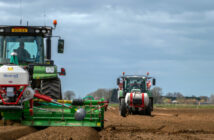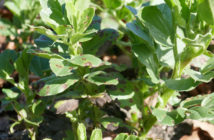Recent BASF reports from across the UK indicate that winter pulse crop yields are much better than many had first thought – with the timing of the dry spell having helped preserve yield potential.
In the latest BASF pulse blog, Pulse Check, PGRO’s chief executive officer Roger Vickers explained that while the market remains volatile, domestic pulse demand is rising.
“There are a combination of factors continuing to affect markets,” he explains, “the war in Ukraine is affecting everything; the pandemic influence lingers; and shipping prices are continuing to rise, but domestic demand on the whole is improving.”
Mr Vickers continued: “The vast majority of trade for crop 2021 is finished. Feed beans peaked at £340/t ex farm and marrowfat peas smashed the £500/t barrier but there is now considerable volatility and, although prices have fallen, they continue to fluctuate.”

PGRO chief executive officer Roger Vickers
BASF’s Yorkshire agronomy manager, Mat Barnes added that he is seeing “very limited bruchid damage up north,” too.
“Where winter beans have gone into good seedbeds, we can see that paying dividends as roots have been able to establish and keep the crop going through the dry spells. While conditions were dry in April and early May, there was some residual moisture and this seems to have carried us through.”
However, Mr Barnes believes that it will be the spring-sown beans that are likely to have suffered the most, due to the recent heat wave and lack of moisture causing pod and seed set issues, though it will be a while before these are harvested.
Mr Barnes’ belief is also echoed by Andrew Smooker, the BASF agronomy manager for the east of England, who said: “Spring bean harvest is a few weeks off but the feeling is that they will have suffered more; crops haven’t senesced naturally – they’ve run out of moisture and died. It is likely to effect yield.”

Chris Judge, PGRO’s senior technical officer
PGRO’s senior technical officer Chris Judge, who runs field trials predominantly in the Midlands, also commented on the dry spell: “For the last three years we’ve had dry Aprils. This year, in the Midlands at least, there seemed to be enough residual moisture in soils to help crops cope with the dry spell and, when rain arrived, it was a little earlier than in 2020 or 2021; this helped preserve yield potential.”
Commenting on the pulse varieties coming through the trials, Mr Judge said: “It’s been interesting to see the range of traits breeders are pulling through in the new varieties. The range is growing, and as well as the high-yielding material, we’ve some novel traits making an appearance.”
“In spring beans, for example, there are unusual characteristics such as higher protein, low vicine and low convicine, larger seed size and rust resistance to name a few.”
“There’s been lots of high yielding material added to the pea list in the last few years, with the two highest yielding white peas entering the list in 2020, and five out of the top six blue varieties being added in the last three years. The best white and the best blue are yielding 115% or more relative to the control yield and several others are around 110%.”
Mr Judge concludes by advising any growers who haven’t reviewed their variety choice for a while, that they take a look at the new varieties list in November.




